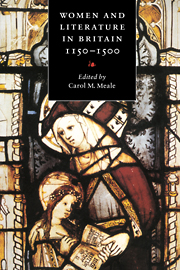Book contents
- Frontmatter
- Contents
- List of illustrations
- List of abbreviations
- Chronology: women and literature in Britain, 1150–1500
- Introduction
- 1 The power and the weakness of women in Anglo-Norman romance
- 2 Women as lovers in early English romance
- 3 Mothers in Middle English romance
- 4 ‘Clerc u lai, muïne u dame’: women and Anglo-Norman hagiography in the twelfth and thirteenth centuries
- 5 Women in No Man's Land: English recluses and the development of vernacular literature in the twelfth and thirteenth centuries
- 6 ‘Women talking about the things of God’: a late medieval sub-culture
- 7 ‘… alle the bokes that I haue of latyn, englisch, and frensch’: laywomen and their books in late medieval England
- 8 Women authors and women's literacy in fourteenth- and fifteenth-century England
- 9 Women and their poetry in medieval Wales
- Further reading
- Index of manuscripts
- Index of names and titles
6 - ‘Women talking about the things of God’: a late medieval sub-culture
Published online by Cambridge University Press: 09 November 2009
- Frontmatter
- Contents
- List of illustrations
- List of abbreviations
- Chronology: women and literature in Britain, 1150–1500
- Introduction
- 1 The power and the weakness of women in Anglo-Norman romance
- 2 Women as lovers in early English romance
- 3 Mothers in Middle English romance
- 4 ‘Clerc u lai, muïne u dame’: women and Anglo-Norman hagiography in the twelfth and thirteenth centuries
- 5 Women in No Man's Land: English recluses and the development of vernacular literature in the twelfth and thirteenth centuries
- 6 ‘Women talking about the things of God’: a late medieval sub-culture
- 7 ‘… alle the bokes that I haue of latyn, englisch, and frensch’: laywomen and their books in late medieval England
- 8 Women authors and women's literacy in fourteenth- and fifteenth-century England
- 9 Women and their poetry in medieval Wales
- Further reading
- Index of manuscripts
- Index of names and titles
Summary
A new consensus about the nature of Chaucer's initial readership in the 13 80s and 1390s seems to have emerged over the last decade or so. The old courtly audience of leisured aristocrats, male and female, that used to be extrapolated from the Troilus frontispiece has given way to another, composed of readers rather than listeners, gentry rather than nobility: busy administrators, soldiers, men of affairs. This new initial audience – the Chaucer circle, as it is now called – is predominantly, perhaps even exclusively, male. Moreover the most recent work by a historian on the household of Richard II emphasises its masculinity: we have been shown that it was composed almost entirely of men, that they ate their meals in shifts and slept at night wherever they could find floor-space. Even senior members of the household had to bed down on pallets in the passageways and vestibules. The whole place presumably smelt of horses, sweat and unwashed feet.
The Chaucer circle, most of whom worked in this unappetising ambience, are members of a civil service sub-culture: they are laymen who know French and Latin, they write as well as read (many are poets themselves), they are oriented towards the public world, they share a class outlook and, as readers of Chaucer, form a textual community. Nevertheless it would be a mistake, I think, to imagine that being members of that textual community was not complicated; Chaucer's open-ended poetry does not seem to be either the product or the source of an unproblematic relationship with any reader.
- Type
- Chapter
- Information
- Women and Literature in Britain, 1150–1500 , pp. 104 - 127Publisher: Cambridge University PressPrint publication year: 1993
- 41
- Cited by



